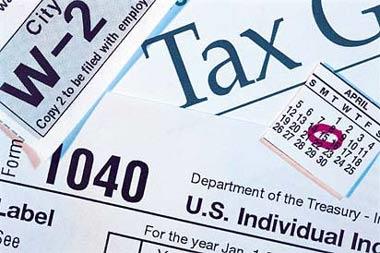As the tax deadline approaches, clever crooks use the IRS to try and separate you from your hard-earned money.
Like most people, you probably have a healthy respect for the taxman. But don't let that intimidation factor override your common sense. Be on the alert for these four common tax scams.
1. Phishing Using the Refund Lure
The most common scammer tactics are variations on the tried-and-true phishing trick that uses a phony email to solicit your private information, such as your Social Security number, bank account numbers and passwords.
Here's how one ploy works: An official-looking, but fraudulent, "IRS" email asks you to provide personal information by directing you to a website that may look like the real thing -- but isn't. The email may offer you a bigger refund if you respond immediately, or warn you that you didn't submit important information, such as your W-2 wage and tax statement from your employer. Or, the scam may take a different tack and threaten you with penalties or criminal prosecution if you don't act. With the rapidly growing number of smartphone users, phishing also can occur through links in phony text messages.
Don't fall for these cons. The IRS doesn't send unsolicited emails or texts to taxpayers and doesn't ask for passwords, PINs or other personal information. If you receive a suspicious email or text message claiming to be from the IRS, don't click any attachments or links. Forward the message to phishing@irs.gov, and then delete it immediately.
"Through phishing, the bad guys get your personal info and passwords, which could allow them to steal your identity and take over your accounts," cautions J.J. Montanaro, a CERTIFIED FINANCIAL PLANNER™ practitioner at USAA. "Tax information has so much bank account information that this scam poses substantial risk to finances."
"Remember the old saying, 'If it sounds too good to be true, it probably is,'" says Montanaro. "No matter what the offer, don't give up your personal information."
Be On Guard Online and Offline- Make sure your software applications are up-to-date.
- Use a standard anti-malware application to help keep viruses and malicious applications off your computer and to help block dangerous emails and scams.
- Add an extra layer of security to your Web browser with Trusteer Rapport, a free software that informs you if a website is authentic and safe to use.
- Remember, the IRS does not send unsolicited emails or texts to taxpayers and does not ask for passwords, PINs or other personal information.
- Beware of fraudulent activities that come to you by phone, direct mail, fliers or door-to-door interactions. Scammers aren't limited to the digital world.
- Help arm yourself against identity theft by understanding what it is, the signs to look for when yours is threatened and ways to prevent it.
- Never give out personal information to someone you don't know. And if a tax-return deal seems too good to be true, it probably is. Choose a trustworthy tax preparer or use an automated tax preparation program.
2. The Unscrupulous Tax Preparer
Another way you can be victimized during tax season is by hiring a dishonest tax preparer. If you pay someone to prepare your tax return, the IRS urges you to choose that person wisely. Taxpayers are legally responsible for what's on their tax returns even if the returns are prepared by someone else. Plus, "you'll be sharing very personal information with your tax preparer, so you don't want to make your choice without some solid research," Montanaro adds.
Besides filling out your return incorrectly, questionable preparers can skim your refund, overcharge you and wring cash out of you in other ways.
Before hiring a tax preparer, get references from friends or family members. Search for the preparer's practice online, such as on the Better Business Bureau website or other sites with customer ratings. If you see nontrivial complaints, that's a red flag to look elsewhere.
Make sure your preparer outlines the fees in detail in advance, preferably in writing. One of the most common and simplest tax preparer scams is to charge you a high fee and withhold your return until you pay it. Also, as a taxpayer, know that you aren't required to complete any special forms to obtain your refund. Before signing documents or providing payments, read and understand all forms your preparer provides.
The IRS offers additional tips on selecting a trustworthy tax preparer, including ensuring your preparer has a preparer tax identification number, as required, and making certain that person is able to file your return electronically.
You also might consider bypassing a personal tax preparer and using an automated tax preparation program.
3. The 'Free Money' Come-On
This is an old-school scam that takes place offline. The lure of "free money" is never more appealing than when you're facing a huge tax bill.
Through fliers plastered in public, scammers promise to file a return with no information required, or they offer to get you an early tax refund or Social Security payout. Low-income and older consumers are the most frequently targeted victims.
If you see a flier like this, ignore it. Better yet, report it to the building owner or merchant where you see the posting and ask that it be taken down.
4. The Phony Charity
It's a sad reality, but in the wake of any natural disaster or national tragedy, scammers use related charities to make some fast cash. During tax season, scammers will up the ante by promising that a donation you make now will earn you a deduction on your taxes for last year.
"Charitable deductions are taken for the tax year in which they are made," explains Montanaro. "If someone is asking you to donate and promising a tax deduction for the return you're working on now, that's an indicator you've got a problem."
You can do the most good by initiating donations yourself via a Trusteer Rapport-approved charity website. Don't donate to door-to-door collectors or over the phone, where you can't verify the charity's or solicitor's legitimacy.









